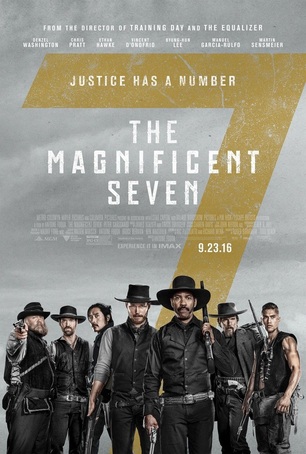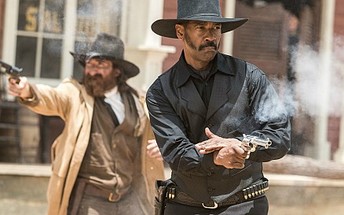Written by Mike Cervantes The old saying goes that the more you Xerox something, the less of the original you actually get to see. Enter The Magnificent Seven, a film by Antoine Fuqua that is a remake of a western, based upon the very influential Japanese film, Kurosawa’s Seven Samurai. The moment this concept was announced it was already panned, because, really who needs it? Still, I have to admire Fuqua for, at least, trying to put his best foot forward with the proposition: teaming up, once again, with his Training Day leading man, Denzel Washington, placing him in a starring role, and re-working the film to reflect our modern day sensibilities, instead of leaving the original’s themes of xenophobic Mexican villages and Indian burial in the 1960s. You know, from that Oscar-winning film, that this is a director that can candle concepts like loss, fear, and the dark and torturous innards faced by moral ambiguities. The real downside to knowing that however is that you’ll then watch this film, and realize those were the very themes that were left on the cutting room floor. Long gone are the concepts of lawlessness and the struggle to survive in an unforgiving frontier in our modern cinema. The conflict in this version of the film begins when a mercilessly wealthy minor baron named Bartholomew Bogue (Peter Sarsgaard) intends to mow down a small western village so he can sit on the gold mining rights. Within the first ten minutes of the opening act, he’s burned the city’s symbol of faith, the church at the head of town square, to the ground, and killed an abundance of townspeople, including the husband of Emma Cullen (Haley Bennett). Emma flees to another town where she finds a warrant officer, Sam Chisolm (Washington), and pays her last dime to convince him to bring Bogue to justice. Enter the remainder of the title cast: Chris Pratt is Josh Faraday, a stereotypical western drifter and gambler, who makes good use of playing card metaphors. Ethan Hawke is Goodnight Robichet, a former Union soldier who has a deadeye and a deep fear of the standing conflict, and his associate Byung hun-Lee, an Asian gunslinger that predictably also has throwing knives and martial arts as part of his repertoire. Vincent D’Onofrio is Jack Horne, a bear-sized woodsman who used to hunt for scalps for the government, puts in, surprisingly, the most memorable character role by acting like an imbecile but quoting full biblical epithets while he’s slaying rows of outlaws. Manuel Garcia-Rulfo as Vasquez, an outlaw blackmailed to join the party, and Martin Sensmeier as Red Harvest, a Comanche living in self-imposed exile.  Overall, the narrative is progressive in a way that accepts the diversity of its cast without being overt about what ethnicity is in what role, and does so without resorting to the standard western film stereotypes. Pratt’s Faraday loves to mock Manuel’s Vasquez just for being a Mexican, until they bond and Vasquez reduces Faraday to a single Spanish swear-word. Predictably, when Hawk’s Robichet becomes too scared to continue the fight, Emma Cullen volunteers to take his shotgun. There’s also a rather clunky moment in the second act where the so far self-involved Bogue has a Comanche guide named Denali (Johnathon Joss), who Red Harvest immediately declares to be dishonorable. Then they fight. There is never a reason to question why this entire western party is being led by Denzel Washington either, and I’d expected the entire film to overlook the racist elephant in the room, until a reveal in the third act shows they had said concept in the back of their minds the entire time. The structure of this film is actually pretty sound, and it works its way across all three acts admirably except in one category: character motivation. So many instances through the film, you’ll hear the characters mumble. Often western actors speak under their breath, but it is done here so many times to such a ridiculous degree, it almost seems like they didn’t even want to write the dialogue. It’s a strange choice, especially since the previous versions of this film were all about the backstory. I failed to understand Chris Pratt’s reason for being in this army, if it was in the movie at all. Then there’s the fact the premise of Kurosawa’s work was not truly about good or evil, but about the lengths men strive to in order to survive. The presence of Bogue as a completely committed supervillain completely wrecks that prospect, and even though they try to rectify it with Chisolm’s reveal in the third act, it fails to shock, both because it becomes too late, and once again, because the dialogue is being whispered by the actors. The Magnificent Seven doesn’t pull any punches in regards to the thing that it is. Unfortunately, it is a pretty unnecessary remake. In the end, it at least has the guts to be an unnecessary remake, as opposed to a poorly sewn-together one, like Man of Steel, or an accepted, though pretty poorly conceived remake, like Star Trek Into Darkness. It’s a shame to think, though, that a classic and time-honored concept like Kurosawa’s magnificent original had so much more to say and so much more influence to bring to the overall cinematic landscape, than a far later film that is directly inspired by it.
0 Comments
Leave a Reply. |
Archives
March 2025
|
|
© 2012-2025, Nerds That Geek LLC.
All Rights Reserved. |
uWeb Hosting by FatCow


 RSS Feed
RSS Feed